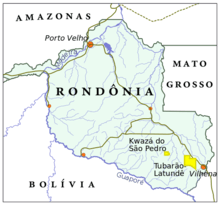Aikanã
The Aikanã are an indigenous people of Brazil, living in the state of Rondônia, in the western Amazonian lowlands. They are also known as the Cassupá, Massaca, Columbiara, Huari, Mundé, and Tubarão.[1]
| Total population | |
|---|---|
| 180 (2005)[1] | |
| Regions with significant populations | |
| Languages | |
| Aikanã language[2] | |
| Religion | |
| Animism |
Land
The Aikanã's traditional lands are in the region of the Guaporé River. In 1970, the Brazilian government moved the tribe onto the Tubarão-Latundê Indigenous Territory, with poor soil. They have three villages and live in nearby cities, such as Vilhena.[3]

The areas where Aikanã speakers live in Rondônia
[4]:406
Language
Aikanã people speak the Aikanã language, which is an unclassified language. Its ISO 639-3 language code is "tba".[2]
Notes
- "Aikanã: Introduction." Povos Indígenas no Brasil. (retrieved 27 April 2011)
- "Aikanã." Ethnologue. (retrieved 27 April 2011)
- "Aikaña: Location and Demographics." Povos Indígenas no Brasil. (retrieved 27 April 2011)
- Birchall J, van der Voort H, Aikanã L, Aikanã C (2017). "Aikanã". In Stenzel K, Franchetto B (eds.). On this and other worlds: Voices from Amazonia (pdf). Berlin: Language Science Press. pp. 405–438. doi:10.5281/zenodo.885273. ISBN 978-3-96110-018-7.
gollark: I wouldn't say the virus has a goal any more than a computer program does or something. The difference is that if you set an intelligent thing a goal, it can reason about the best way to accomplish it.
gollark: Also, large-scale competition burns a ton of resources which would ideally not be used up.
gollark: I say this because you said> do you really want a second rate species succeeding?but it isn't a given that because something won at competition it's actually *better*.
gollark: It's the easiest example I could come up with. You could probably look at history or sports too.
gollark: That isn't really a goal. Virioids aren't going around thinking about their goals and how best to satisfy them. They just do things related to that due to the output of blind optimisation processes.
This article is issued from Wikipedia. The text is licensed under Creative Commons - Attribution - Sharealike. Additional terms may apply for the media files.